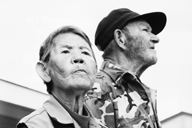And Thereafter
Geurigo Geu Hu KOREA / 2003 / English, Korean / Color, B&W / Video / 55 min
KOREA / 2003 / English, Korean / Color, B&W / Video / 55 min
Director, Script, Photography, Editing, Sound: Lee Hosup
Music: Na Yung-ho
Producer: Im Hyun-ock
Production Company, Source, World Sales: Docu-Eye Productions
21-71 36th St. No. 2R Astoria, New York 11105-2103 USA
Phone: 1-718-267-7177
Fax: 1-718-267-1199
E-mail: imhyunock@earthlink.net
An elderly Korean woman who married a G.I. after the Korean War has lived in the U.S. for over forty years. Though Americans looked down on her because of her poor English and Koreans called her a whore, she has managed to bring up three children in a large house under blue skies, just like a typical version of the American dream. Her surroundings change with the seasons, from spring when fresh greenery sprouts up, to winter in the deep snow. The pitiful history of her life with her husband and children is unveiled little by little. Her small body and her bent back, shown in the field where she farms chili peppers under the fluttering Korean flag, reflect both the pathos of an individual who is at the mercy of destiny, and the strength of her will in accepting it.
[Director’s Statement] After the Korean War, 10,000 Korean women married American G.I.s and came to the United States. For them, marriage was the only escape from the crushing poverty of post-war Korea. Going to America meant leaving starvation behind and living the rest of your life in Mikook, or the “beautiful country.” I started this film wanting to know the “thereafter” part of the lives of these women after the marriage ceremony.
Young-ja Wike is one of these women. Today she lives in Browns Mills, New Jersey growing red peppers. Despite a high divorce rate among Korean War brides and problems in her own marriage, she has continued to live with her husband. The dream of most seventy-six-year-old women is to be surrounded by family with meaningful work to do. But the reality of her life is much more complicated. Isolated in a country she would rather not be in, unable to return to Korea, and with a husband and children who are virtual strangers to her, Grandma Wike isn’t living the American Dream. She is in American Limbo, where she can only count the passing years by the growing lines on her face.
We have come to know that the international is individual, that international events or policies have great influence upon individual lives. Because of the unequal status between Korea and the United States, the international environment has had a destabilizing effect upon the domestic environment. In turn, relationships between individuals are unstable and unequal. In Grandma Wike I see the unequal relationship between Korea and the U.S. and a painful Korean history.
 Lee Hosup
Lee HosupBorn in Seoul and graduated from Seoul National University. After completing studies in public administration at New York University, returned to Korea and worked as a producer and director for several years with KBS Media Enterprises. Main project was the documentary program Sunday Special, producing and directing over ten documentaries on subjects ranging from jazz to the search for extraterrestrial life. Returned to New York and enrolled in the M.F.A. program at City College of New York. This is the full-length version of And Thereafter, his thesis short film, which received Best Documentary Award and Best Cinematography Award at Citivisions 2001 and was selected for the 25th Asian American International Film Festival. |
|
• New Asian Currents | Sand and Water | Wellspring | Three-Five People | Homesick | The Circle’s Corner | The Maze of Lanes | Nee Engey—Where Are You | NEW (IMPROVED) DELHI—Director’s Cut | A Night of Prophecy | 150 Seconds Ago | The Ballad of Life | Noah’s Ark | The Old Man of Hara | Dandelion | Hibakusha—At the End of the World | 3rd Vol.2—2 Light House | And Thereafter | Dust Buries Sabuk | Family Project: House of a Father | Edit | Gina Kim’s Video Diary | Ordo | Her and Him Van Leo | The Big Durian | Perpetual Motion | Debris | Hard Good Life | Nail | The Rhythm in Wulu Village | A Short Journey • Jurors | Kim Dong-won | Kawase Naomi • New Asian Currents Special | Part 1 | Part 2 |
